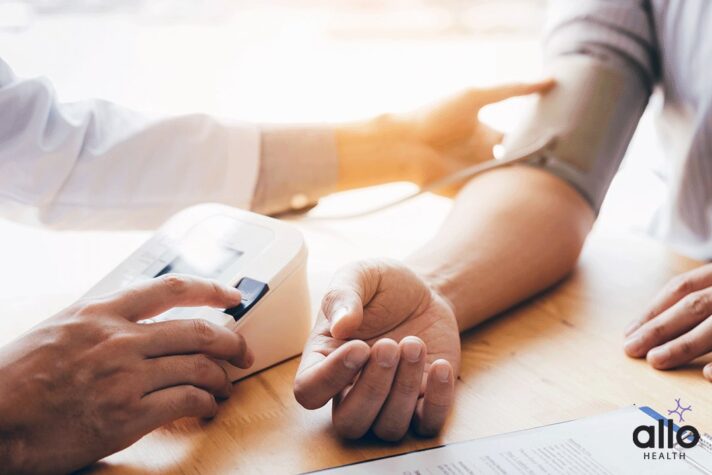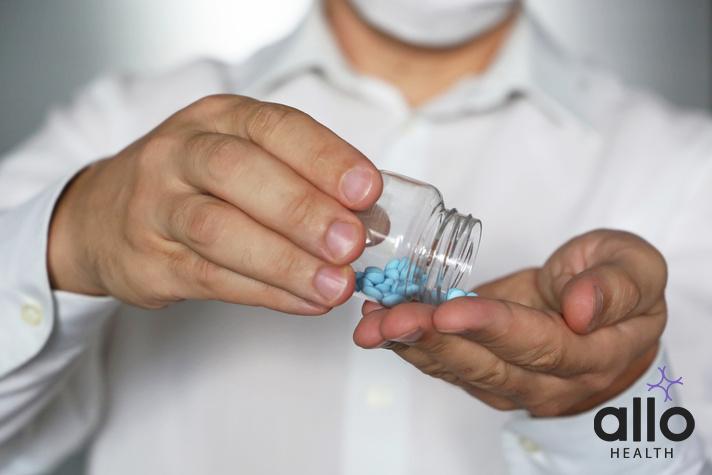Sex Drive Test Guide

Allo Health is dedicated to personalized well-being, offering support and trusted information tailored to individual health goals. The platform emphasizes human-generated content, led by a distinguished medical team of experts, including physicians and sexual health specialists. Their commitment to credibility involves rigorous fact-checking, authoritative research, and continuous updates to ensure accurate, up-to-date information. Allo Health's unique approach goes beyond conventional platforms, providing expert-led insights and a continuous commitment to excellence, with user feedback playing a crucial role in shaping the platform's authoritative voice.

Dr Sanina Mansoor holds MBBS degree from Yenepoya university,Mangalore.She has 8 years of experience working as a medical officer at various health centres and medical colleges.
Why This Was Upated?
Our experts continually monitor the health and wellness space, and we update our articles when new information became available.
Updated on 05 February, 2024
- Article was updated as part of our commitment to diversity, equity, and inclusion.

"The following blog article provides general information and insights on various topics. However, it is important to note that the information presented is not intended as professional advice in any specific field or area. The content of this blog is for general educational and informational purposes only.
Book consultation
The content should not be interpreted as endorsement, recommendation, or guarantee of any product, service, or information mentioned. Readers are solely responsible for the decisions and actions they take based on the information provided in this blog. It is essential to exercise individual judgment, critical thinking, and personal responsibility when applying or implementing any information or suggestions discussed in the blog."
Sexual activity and the desire for a fulfilling sex life are fundamental aspects of our overall well-being. However, various factors can impact our sex drive, leading to concerns about sexual function and desire. This article will explore the importance of a sex drive test, key factors affecting sexual desire, and potential treatment options for those experiencing concerns related to their libido.
What is Sex Drive?
Sex drive, also known as libido, is a complex and innate human desire for sexual activity. It encompasses the physical, emotional, and psychological urge to engage in sexual behavior. Key points about sex drive include:
- Biological Basis: Hormones, such as testosterone and estrogen, play a crucial role in regulating sex drive.
- Psychological Factors: Emotions, mental well-being, and attraction contribute to sexual desire.
- Individual Variation: Sex drive varies among individuals and can change over time due to factors like age, stress, and health.
- Relationship Impact: It influences the quality of sexual relationships and can affect overall intimacy.
- Cultural and Social Influences: Societal norms, cultural upbringing, and personal experiences shape one’s sex drive.
Effects of Sex Drive on Sexual Health
Sex drive, also known as libido, plays a pivotal role in one’s sexual health and overall well-being. It influences sexual activity, desire for sex, and the quality of one’s sexual relationships.
- Desire for Sexual Activity: A healthy sex drive is essential for initiating and maintaining sexual activity, contributing to a fulfilling sex life.
- Hormone Levels: Sex drive is closely tied to hormone levels, particularly testosterone and estrogen. Fluctuations in these hormones can lead to a decrease in sexual desire.
- Sexual Function: Diminished sex drive can result in sexual dysfunction, such as erectile dysfunction in men or arousal disorders in women.
- Mental Health: Mental health conditions like depression and anxiety can reduce sex drive, affecting overall sexual health. Addressing these conditions through therapy or counseling is crucial.
- Physical Symptoms: Concerns like chronic stress, cardiovascular disease, and hormonal imbalances can contribute to a drop in sex drive and impact sexual health negatively.
- Lifestyle Factors: Engaging in regular physical activity, managing stress, and avoiding excessive alcohol or recreational drug use can positively affect sex drive and overall sexual health.
- Quality of Relationships: A healthy sex drive is often indicative of a healthy relationship. Effective communication and physical affection are essential for maintaining sexual health within a partnership.
A strong sex drive is quite important for sexual health, influencing sexual activity, satisfaction, and the overall quality of one’s sex life. Understanding the factors affecting sex drive and seeking appropriate treatment when necessary are vital for maintaining a healthy sexual relationship and overall well-being.
Health Complications Due to Low Sex Drive
Low sex drive, also known as hypoactive sexual desire disorder (HSDD), can lead to various health complications and negatively impact one’s overall well-being. Here are some health complications associated with a diminished sex drive:
- Relationship Strain: Reduced sexual desire can lead to emotional distance and strain in relationships, affecting the quality of your sexual relationship and daily life.
- Mental Health Concerns: A decreased sex drive can contribute to or exacerbate mental health conditions like depression, anxiety, and chronic stress, which can further diminish libido.
- Physical Symptoms: In men, it may result in erectile dysfunction, while women may experience sexual arousal disorders or vaginal yeast infections.
- Infertility Concerns: For couples trying to conceive, a low sex drive can hinder their chances of becoming parents.
- Unresolved Underlying Health Concerns: In some cases, a reduced sex drive may be a symptom of an underlying medical condition, such as hormonal imbalances or cardiovascular disease, which should be addressed promptly.
- Hormonal Imbalances: Low libido can be indicative of underlying hormonal imbalances, potentially leading to concerns like cardiovascular disease or diabetes, affecting overall health.
- Diminished Quality of Life: A lack of sexual desire can have a profound impact on one’s quality of life, as it can reduce the desire for intimacy and the pleasure derived from it.
- Lack of Self-Esteem: Persistent low libido can lead to feelings of inadequacy and reduced self-esteem, affecting one’s self-image and confidence.
- Reduced Physical Affection: A decreased sex drive may result in a lack of physical affection, which is essential for maintaining a healthy relationship.
- Stress and Anxiety: Stress hormones may further decrease sexual desire, creating a vicious cycle of stress-related complications.
Addressing a low sex drive promptly through a sex drive test and appropriate treatment options can help mitigate these health complications and improve one’s overall sexual health and well-being.
Different Sex Drive Tests

Detecting low sex drive involves a combination of tests and assessments, taking into account various factors such as hormonal imbalances, physical symptoms, mental health conditions, and lifestyle influences. Here are the key tests and assessments commonly used:
- Hormone Level Tests: Measuring hormone levels, including testosterone and estrogen, is crucial to identify hormonal imbalances that may contribute to a reduced sex drive. Fluctuations in these hormones can have a significant impact on sexual desire.
- Blood Tests: Comprehensive blood tests can help determine if underlying medical conditions like cardiovascular disease or diabetes are affecting sexual function and libido. Abnormalities in blood pressure and glucose levels may be indicative.
- Physical Examination: A thorough physical examination by a healthcare professional can reveal physical symptoms such as erectile dysfunction in men or sexual arousal disorders in women, which can be common indicators of reduced sex drive.
- Mental Health Assessment: Assessing mental health conditions, such as depression, anxiety, or chronic stress, is crucial as these conditions can lead to a decreased sex drive. Open communication with a mental health professional may be necessary.
- Health History and Lifestyle Evaluation: Your health history, including any existing medical conditions or medication use, should be discussed. Lifestyle factors like daily life stress, alcohol consumption, and recreational drug use must also be considered during assessments.
- Sexual History Discussion: A candid discussion about your sexual history and experiences can provide insights into any potential underlying concerns affecting your libido.
- Communication Skills Assessment: Evaluating communication skills and the dynamics of your relationships can help identify if emotional factors or relationship concerns are contributing to the problem.
- Pelvic Exam (for women): In cases of sexual dysfunction in women, a pelvic exam may be performed to assess any physical abnormalities, such as vaginal yeast infections or pelvic conditions.
By combining these tests and assessments, healthcare professionals can better understand the root causes of low sex drive and develop tailored treatment plans, which may include hormone therapy, counseling, lifestyle adjustments, or medication, depending on the individual’s unique circumstances.
Treatments Options

Treatment options for low sex drive, also known as reduced libido or hypoactive sexual desire disorder (HSDD), vary depending on the underlying causes and individual needs. Here are some key treatments and strategies:
- Hormone Therapy: For individuals with identified hormone imbalances, hormone replacement therapies like testosterone or estrogen therapy can help restore hormonal balance and improve libido.
- Counseling: Psychotherapy or counseling can be beneficial when mental health conditions, stress, or relationship concerns contribute to low sex drive. It helps address emotional and psychological factors affecting sexual desire.
- Lifestyle Changes: Incorporating healthy lifestyle change can boost libido. Regular exercise, stress management, reducing alcohol and drug use, and maintaining physical affection in the relationship can all make a significant difference.
- Medications: In some cases, healthcare professionals may prescribe medications to address sexual desire disorders. These medications can help stimulate desire or manage underlying concerns affecting libido.
- Communication and Relationship Building: Improving communication with your partner and addressing any unresolved conflicts or concerns can enhance intimacy and desire. Building a healthy relationship is crucial for a satisfying sex life.
- Alternative Therapies: Some individuals explore alternative therapies, such as herbal supplements or acupuncture, to boost their libido. However, the effectiveness of these treatments varies, and it’s essential to consult with a healthcare professional before trying them.
It’s important to note that the treatment plan should be tailored to the individual’s specific needs and the underlying causes of low sex drive. Consulting a healthcare professional or a therapist is the first step in identifying the root causes and determining the most suitable treatment option. Open communication and seeking help are vital for addressing and improving low sex drive, ultimately enhancing one’s overall quality of life and sexual satisfaction.
Conclusion
Understanding your sex drive and addressing any concerns related to it is crucial for a healthy sex life and overall well-being. A comprehensive sex drive test, considering factors like hormone levels, physical symptoms, mental health, and lifestyle, can provide valuable insights. Remember that open communication with your partner and seeking help from a healthcare professional are essential steps towards improving your sex life and quality of life.
Most Asked Questions
-
What is a sex drive test, and why might I need one?
A sex drive test, also known as a libido test, is a way to check how much you desire sexual activity. You might need one if you’re concerned about changes in your sex life, like a drop in desire or problems with your body during sex.
-
Can hormone levels affect my sex drive, and how can I find out if they’re causing concerns?
Yes, hormone levels can affect your sex drive. You can find out if they’re causing concerns by getting a blood test. It measures hormones like testosterone and estrogen. If they’re too low or too high, it could be affecting your desire for sex.
-
What are some lifestyle factors that can impact my sex drive, and how can I improve it?
Lifestyle factors like stress, lack of physical activity, or using drugs and alcohol can impact your sex drive. To improve it, try managing stress, staying active, and avoiding excessive alcohol or drug use. These changes can help boost your desire for sex.
-
What should I do if I’m worried about my sex drive or experiencing problems in my sexual relationship?
If you’re worried about your sex drive or having concerns in your sexual relationship, it’s important to talk to a healthcare professional. They can help figure out the cause and suggest treatments like therapy, medications, or lifestyle changes to improve your sex life. Communication with your partner is also crucial in addressing these concerns together.






































